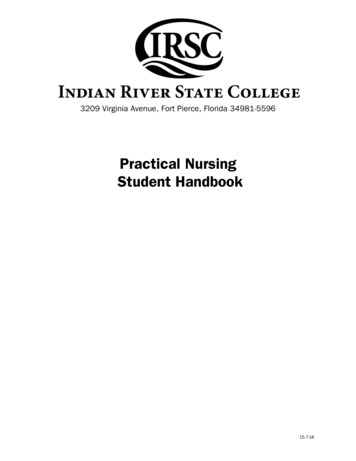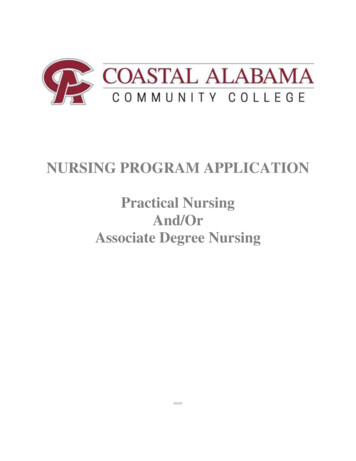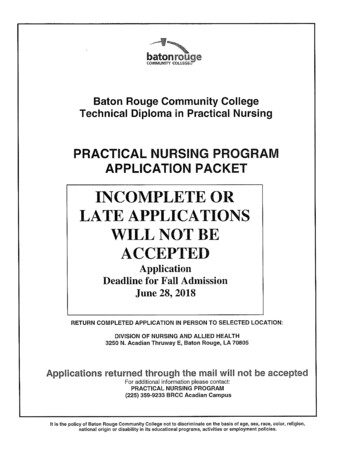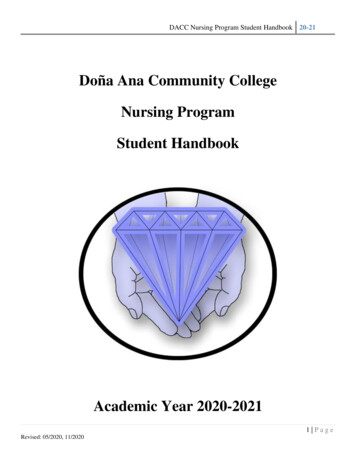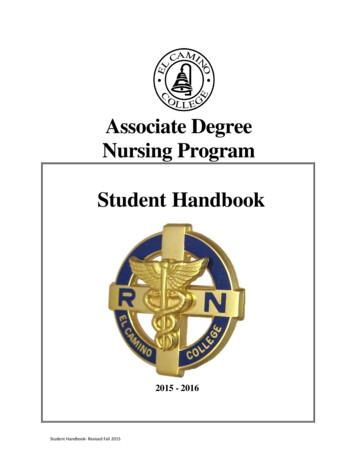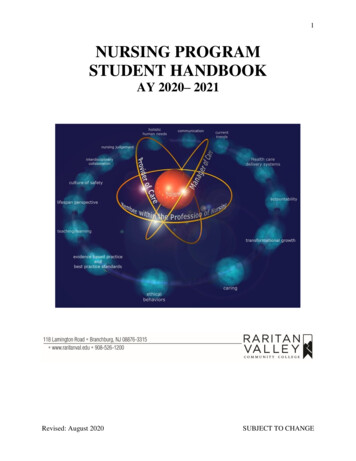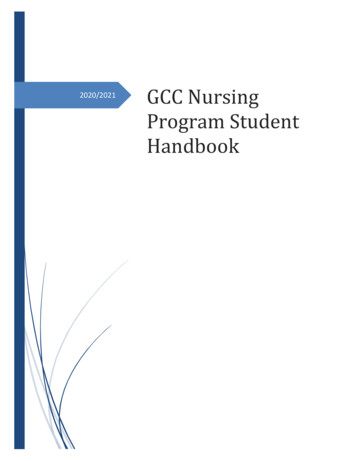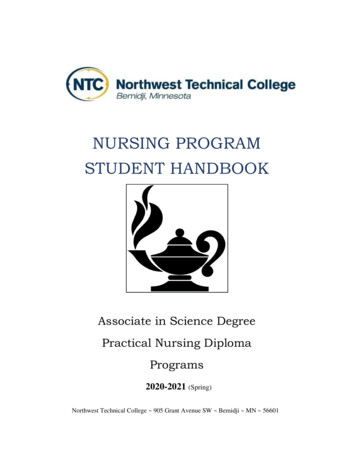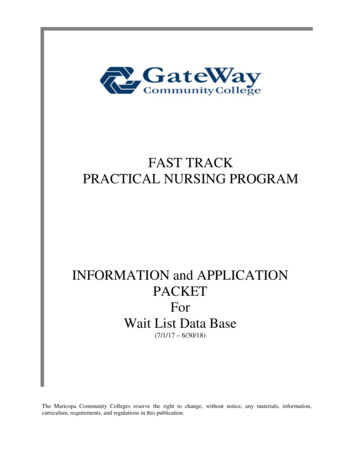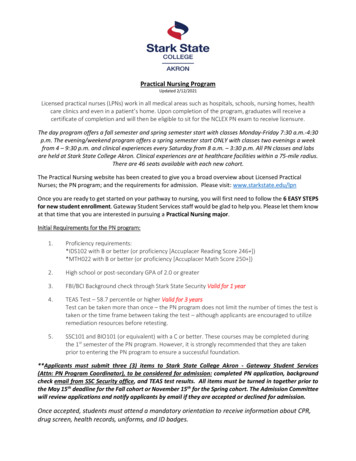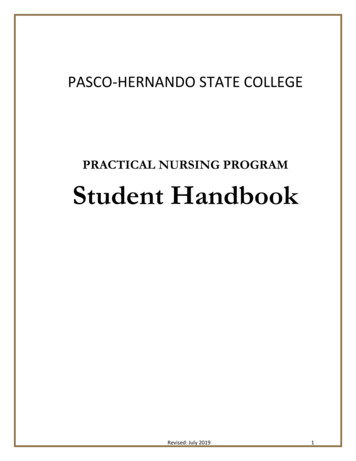
Transcription
PASCO-HERNANDO STATE COLLEGEPRACTICAL NURSING PROGRAMStudent HandbookRevised: July 20191
TABLE OF CONTENTSI.Nursing Programs Overview . 41.Mission . 52.Purpose . 53.Philosophy. 54.Nursing Education. 5-65.Nursing Scholarship Definition . 66.Nursing Program’s Conceptual Framework/Roles of the Nurse . 7-87.Nursing Department Organizational Chart: ADN and LPN . 9-108.Technical Certificate Practical Nursing . 119.PN Program Objectives . 1110.PN Intended Outcomes . 11II.Student Policies . 121.HIRRE Policy . 132.Criminal Background Checks . 143.Health Clearance. 144.Drug Screen. 155.Insurance Coverage . 156.Disabilities . 157.Attendance . 15-168.Testing/Examination . 16-179.Academic Dishonesty. 17-1910.Guidelines for Written Assignments . 1911.ATI Testing. 19-2012.Clinical Dress, Grooming Code and Uniform Policies . 2113.Uniform Requirements: Clinical and Observational. 2114.Grooming . 21-2215.Student Evaluation. 2216.Laboratory Evaluation Procedures . 2317.Clinical Simulation Experiences . 2418.Clinical Evaluation Procedures. 2419.Clinical Misconduct . 24-2520.Required Clinical Paperwork. 2521.Progression in the Program . 2522.SUCCESS Program . 2623.Re-Admission to Limited Access Program . 26-2724.Graduation . 2724.Conduct and Faculty Student Interactions . 2825.Dismissal from the Nursing Program . 2826.College Services . 2827.Student Employment . 28III.Occupational Safety Guidelines. 291.Infection Control Policies . 302.HIV - Hepatitis Policy. 303.Personal Protective Equipment (PPE) . 314.Varicella/Rubella Policy . 315.PPD . 316.Respiratory Protection Policy . 317.Flu Immunization Policy. 32Revised: July 20192
IV.Student Nurse Associations . 331.Nightingale Nursing Club . 343.Pinning Ceremony. 34V.Graduate Licensure Instructions . 351.Instructions . 362.Program Codes. 36VI.Appendix. 381. Assessment Technology Institute Overview . 392. Administration & Grading Policies of Proctored Specialty Exams . 393. Testing Procedure . 40-43This Student Handbook is designed to provide you with information about Nursing Programs. It is to be used in conjunctionwith the PHSC College Catalog and the nursing course syllabus for each course. Every effort is made to keep theinformation in this Handbook current. However, policy and procedural changes may be made at any time. Therefore,please check with your instructor each semester. It is your responsibility to keep up to date. Any portion of the NursingPrograms Handbook may be revised at any time by action of the Nursing Department. Such revision shall be binding on allparties.AccreditationSouthern Association of Colleges and Schools Commission on CollegesPasco-Hernando State College is accredited by the Southern Association of Colleges and Schools Commission on Colleges toaward Associate and Baccalaureate Degrees. Contact the Commission on Colleges at 1866 Southern Lane, Decatur, Georgia30033-4097 or call 404-679-4500 for questions about the accreditation of Pasco-Hernando State College.Revised: July 20193
PASCO-HERNANDO STATE COLLEGESection INursing Programs OverviewRevised: July 20194
Nursing Program’s MissionThe Nursing Programs at Pasco-Hernando State College (PHSC) serve to support and assist in implementing the philosophy andobjectives of the college through the Associate Degree Nursing Program, the Technical Certificate Practical Nursing Program,and continuing education for licensed nurses. Members of the nursing faculty recognize their responsibilities to support diverselearning experiences which guide students in attaining academic success and cultural growth, to build and expand theirknowledge and skills to promote their own personal and professional development and to participate in community activitiesin a global society.PurposeThe Technical Certificate Practical Nursing Program will:1.Prepare an educated entry level practitioner who provides safe, competent nursing care to clients experiencingdefined health needs with predictable outcomes in a variety of nurse practice settings.2.Provide a foundation for future education in nursing and lifelong learning.3.Foster a commitment to the art and science of nursing.4.Provide opportunities for cultural enrichment and for personal and professional development.Nursing PhilosophyThe PHSC nursing faculty believes that nursing is an art and a science with its own unique body of knowledge. This body ofknowledge is derived from the scientific and/or theoretical principles of the arts, nursing and the physical, biological, social andbehavioral sciences.The nursing faculty believes that the core concepts of nursing are the person, health, environment, and nursing. We believethat each person is a unique and holistic individual with dynamic basic health needs which are critical to physiological andpsychological integrity. The person, as a client, is a consumer of health care. We believe that health is a dynamic state in whicha person adapts to changes in his/her internal and external environments to maintain physical, emotional, intellectual, socialand spiritual well- being. We believe that the environment consists of all internal and external factors that influence the person.These factors include but are not limited to physical, bio psychosocial, and cultural surroundings. We believe that nursing isthe interactive, holistic process whereby a client is assisted to attain and maintain an optimal level of health within a nursepractice setting. A client is a person, family, or community. A nurse practice setting is anywhere the physical and/orpsychosocial relationship of nursing care is established.The nursing faculty believes that nursing process provides the framework for analysis of the practice of nursing and helps toincorporate the ability of the nurse to function in identified, interactive roles. Nursing roles are defined as: provider of care,communicator, teacher, manager and member of profession. The nursing faculty further believes that nursing educationprovides the pre-requisite knowledge and environment for nursing students to develop practice and evaluate critical thinkingand clinical judgment based on their scope of practice relative to their licensure status.Nursing EducationThe nursing faculty believes that nursing education is a dynamic interactive process that utilizes theoretical instruction andclinical practice in a curriculum developed by nursing faculty. Opportunities are provided for students to progressively applythe nursing process to client care across the lifespan in a variety of nurse practice settings. Learning experiences reflect theunifying curriculum concepts within the cognitive, psychomotor and affective domains of learning.The nursing faculty believes that learning is a lifelong process that proceeds at varying rates and one in which new informationand experiences are incorporated into and become a part of each individual's cognitive framework. New information andexperiences are incorporated into an individual's cognitive framework more readily when presented from simple to complexand from common (more frequently occurring) to uncommon (less frequently occurring). Learning is demonstrated by changesin attitudes and behavior. Motivation for these changes must take place within the learner and is facilitated by theteaching-learning process that leads to self-discovery.The nursing faculty believes that the evaluation of teaching and of learning are ongoing formative and summative processes.We believe that self-evaluation and instructional evaluation are integral parts of education. Instructional evaluation ispredicated on the responsibility of nursing faculty to maintain expertise in their respective areas such as teaching, service,clinical practice and/or scholarship. Curriculum evaluation is based on established philosophy and objectives, outcomeRevised: July 20195
achievement, and regulatory/accredited agency guidelines that are reviewed annually by nursing faculty. Opportunities forstudent contribution are provided. Faculty, students and a Nursing Advisory Committee participate in review of NursingProgram outcomes.The nursing faculty believes that the Practical Nursing program is the entry level into the practice of nursing. The nursing facultyfurther believes that practical nurses are prepared to provide client services in a variety of nurse practice settings and administercare to clients experiencing defined health needs with predictable outcomes. Practical Nurses assist with client care under thesupervision of the Registered Nurse and within the limits set in the scope of practice.The nursing faculty further believes that the Associate Degree Program in Nursing (ADN) is the minimum preparation forpractice as a registered nurse and that it spans a period of at least two years in an academic setting. The location of the ADNProgram and the Technical Certificate Practical Nursing Program within the community college setting is appropriate to acquirethe necessary body of knowledge for individuals to take their places in the community as educated productive citizens preparedfor competent technical and practical nursing practice. This setting provides educational opportunities without regard to race,color, age, religion, marital status, sex, disability or national origin.This philosophy statement, as developed by PHSC nursing faculty, is in agreement with the standards set forth by the FloridaState Board of Nursing, the Florida Department of Education, and with the criteria established by the National League forNursing Accrediting Commission.Faculty Workshop, Pasco-Hernando Community College, April, 1981.Faculty Workshop, August, 1987.Faculty Review and Approval, June 1991, 1992.Faculty Review and Revision May 1993, January 1994.Faculty Review and Approval, May 1994.Nursing Advisory Committee Review and Approval, January 1995.Faculty Review and Revision, Fall 1999/ Spring 2000Faculty Review and Revision, Fall 2004/ Spring 2005Faculty Review and Revision, Fall 2014Faculty Review and Revision, Fall 2015Faculty Review and Revision, Spring 2017Faculty Review and Revision, Fall 2018Nursing ScholarshipTo ensure an academically rigorous and structured approach to nursing education, the nursing faculty have adopted thefollowing definition of nursing scholarship, which is reflected in the nursing curriculum.Definition of Nursing ScholarshipThe efforts whereby an individual or group of individuals applies learned knowledge in order to promote professionalgrowth of a discipline. The efforts (activities) include but are not limited to: clinical practice, writing for professionaljournals; participating in review/edition/writing of textbooks; attendance at conferences to engage in criticalthinking/learning activities; participating in community, national and international associations, and participating inresearch development of educational engagement/mentoring activities to improve learning outcomesFurthermore, the Nursing Faculty believes that it is imperative to provide learning opportunities for both faculty andstudents to participate in the pursuit of nursing scholarship activities so as to improve both student and professionaloutcomes.Nursing Faculty Meeting, 2010Faculty Review, 2014Faculty Review, 2015Faculty Review, 2017Faculty Review, 2018Revised: July 20196
Nursing Program Conceptual FrameworkThe unifying concepts for the nursing program at PHSC are the basic health needs, roles of the nurse and nursing process.These concepts, as defined by this faculty are:Basic Health Needs: The basic health needs, which are influenced by internal and external factors are as follows:OxygenationIs the need to maintain normal circulatory and respiratory functions as indicated by establishedphysiological factorsNutritionIs the need to ingest and metabolize foods and fluids in order to build and restore tissues and to promotebalance of fluids and electrolytes within the bodyEliminationIs the need to discard products of metabolism that are no longer useful to the bodyMobilityIs the need for movement within the environment to perform activities of living and to maneuver safelyat an optimum level for the personComfort/SafetyIs the need to maintain a positive image, and an environment that is conducive to adequate rest and sleeppatterns, and to manage stress and painSecurityIs the need to function in an environment that provides for protection against disease and assaults orinsults to the personRoles of the NurseThe roles of the Practical Nurse in assisting client(s) to meet basic health needs are identified as follows:Provider of Care: As provider of care, the Practical Nurse utilizes nursing principles, critical thinking and interactive skills toassist the Registered Nurse in the provision of individualized client care, characterized by caring, clinical competence andaccountability.Communicator: As a communicator the Practical Nurse demonstrates cultural awareness, individual respect and unconditionalregard for the client and the client’s choices. This is accomplished through the use of verbal and non-verbal interactive skillsthat support a therapeutic environment of
Nursing Program’s Mission The Nursing Programs at Pasco-Hernando State College (PHSC) serve to support and assist in implementing the philosophy and objectives of the college through the Associate Degree Nursing Program, the Technical Certificate Practical Nursing Program, and continuing education for licensed nurses.
